by Erin Turnham
Context: I began writing this on Monday, March 30, 2020. My kids’ last day at school in person was Friday, March 13, 2020. Our school went on Spring Break March 16-20. Due to Covid-19, in-person school wasn’t an option for the rest of the 2019-2020 school year. For the 2020-2021 school year my kids did school virtually. Thanks to the timeless work of grief and the continuing stresses of those two years, this essay still resonates for me. Note: At this time Grasshopper was using the Medtronic 670g and Dexcom. Since that time he has used the Medtronic 770g and Medtronic Guardian sensor and currently uses the T-Slim Tandem with Dexcom G6.
Today my grief is an empty crushed cardboard pizza box. I feel used up, discarded, smashed. Left in the bottom of the can. Greasy, worthless. Littered with crumbs and soggy sauce smears. Where can I leave this grief? How about guilt? Into which bin do I toss my selfishness? I want to throw it all away. I want to be rid of these jagged, used up emotions that tire my mind, and pray that something good can be made out of the clutter. By someone else. I don’t want to do the work of it, I just want to be rid of it all. Grief is work. Sigh.

In the midst of global troubles, my family is trying to manage the daily routines of type 1 diabetes. We had an incident which brought into sharp focus how much work T1D life is.
Late one evening Grasshopper’s pump alerted that he needed a new infusion site, because we had put the last one on three days earlier. His pump also alerted that it was in need of a battery change. His previous pump, the Animus Ping, could go for a day or so after alerting a battery change was needed. His current pump, the Medtronic 670G, not so much. If it gives an alert for a new battery, it means we had better change it right away. I forgot about that detail and I didn’t immediately change the battery.
Also, I decided that since his blood sugar was in range at that point, we would change his site in the morning. I was tired. He was tired. We were all anxious about the uncertainty of EVERYTHING in March 2020. All I wanted to do was to get everyone settled for the night. As a result of my carelessness, the battery died and Grasshopper’s pump stopped delivering insulin. Thank goodness for all the safety features built into his pump. When the battery can no longer fully power all the pump functions, the Medtronic 670g gives a loud, insistent audio alarm and vibration alarm. The pump woke him and he woke me.
I opened my eyes to his sweet, concerned little eight year old face at my bedside, as he shook me and whispered, “My pump needs a new battery. And I need a new site.” It was morning. Cue the avalanche of Mom guilt. Cue me feeling awful for wanting to go to sleep instead of taking a little more time to change his site and the battery. Cue the deeper pain of knowing this is his reality for life unless there is a cure for type 1 diabetes.
YES, the devices he wears, and the insulin he injects are amazing medical breakthroughs. But there are so many ways for his life support system to fail, including for want of a AA battery. There are so many ways for me to fail him by not promptly carrying out diabetes tasks and modeling for him what needs to be done when. For a person with type 1 diabetes, one night without insulin can truly be a matter of life and death.

This is his reality. This is our reality as a family. And my reality is that I can’t wallow in my guilt and grief. My feelings of guilt won’t change the fact that his blood sugar has been high for half the night and his ketones are high too (1.2). Me feeling sorry about it doesn’t fix the situation. My actions will. So I set my feelings aside in a box and tackle the current situation. Add to the normal morning to do list: change battery, fill insulin cartridge, open that box of feelings later, insert new site.
Check blood sugar, check ketones. Now he is hungry. Give insulin for food. Make sure he eats food. Check in with school via a screen because of Covid. Done.
We all needed to get out of the house. We headed out for a walk around the block while staying away from all of our neighbors. Just then, only 30 minutes after putting on his new insulin infusion site, his pump alarmed. Insulin blockage. New site needed.
Deeeeep breath. Pivot. I looked at his infusion site. I could see the cannula through the little plastic window. Not good. The cannula didn’t go into his skin as far as it should. Scrap the plans to immediately go around the block. Back inside with two kids anxious to play. Prep another site for Grasshopper. Poke yet another hole in my young son’s belly with the inserter. Realize he didn’t get ANY insulin for the snack he just ate. His blood sugar is ridiculously high now. Give him insulin through this new infusion site. Now that the immediate emergency is resolved, I dither about what to do next.
We can’t go exercise with his blood sugar this high. We have to wait for it to come back down. I can’t feed him lunch yet until I know that this site is working and his blood sugar is coming back down. So we wait. The kids work on schoolwork via screens for a bit while I decompress by writing this. Now I can unpack that box of guilt, and anger. Yay! Just what I wanted to do in my few minutes of downtime before my kids once again yell, “MOOOOOOMMMM!”
For me, trouble comes when life is happening too fast all around me and I keep packing the feelings away, mentally stowing them in bins, stuffed in all the nooks and crannies of my mind, in the attic up to the eaves, stacked floor to ceiling in the garage. Keep that garage door closed. It’s fine. Everything is FINE. For me to function, I have to have time to decompress, to unpack the feelings, sort them, and clear the space.
I have to recycle the grief. Repurpose the anger. Use the guilt as fuel. You are reading my emotional recycling bin. Welcome. If there’s something here you can use, take it. I’m repurposing what I can. Everything else will be dumped in the bins for now. There will be more later, but I can’t let it build up.
I believe in the power of small, repetitive, cumulative actions. When our town shut down due to Covid, so did our recycling bins. I had quite a bit stashed in our garage. Thanks to neighbors I found that there was still one spot accepting recycling. It is a good drive away. So I loaded it all up and drove it over. It felt good to be rid of it. I recycle, and have for years, in a community that doesn’t make it easy. My action of putting a week’s worth of materials into recycling instead of a landfill is a small start, but through the years it can have an impact.

Small, repetitive, cumulative actions can build to great things. Brushing my teeth once in my lifetime will not keep them clean. Brushing my teeth for two minutes every morning and evening over the course of my lifetime will do much more for keeping my teeth clean and my whole body healthy. A tiny coral polyp can only make a small structure for itself. But millions together over time make enormous reefs. A single prayer is worthwhile but a daily conversation with God is more likely to build my spiritual life. One 10 minute workout is a great first step toward exercising, but doing it again tomorrow and making it a habit will be better for my body.
Doing type 1 diabetes tasks for a day is good. Modeling for my son consistent, healthy habits in physical and mental health is what will hopefully set him on a sustainable path for life. It is the consistent doing of a thing that is both most worthwhile and very difficult.
And for me, it is better to deal with the grief, anger, frustration more frequently, and in smaller chunks rather than to letting it build up until I have a landslide. Popular culture tends to frame the idea of grief as something a person feels intensely and then finishes, emerging “fixed” on the other side, post-grief. That certainly hasn’t been my experience. There is no post-grief, but that doesn’t mean it is all grief, all the time.
Part of dealing with my own grief has meant dealing with other people’s expectations of my grief. I’d like to toss all of that away too. Grief doesn’t conform to anyone’s timeline, not even my own. Throw away the often repeated platitudes, “Everything happens for a reason,” and, “God doesn’t give you more than you can handle.” Nope to that. Chuck it in the bin. I think it is a slick way for people to pat themselves on the back. We routinely have more than we can handle. I want to make the distinction: yes, bad things happen. I don’t think they always happen “for a reason.” Really sad, awful, scary things happen for NO reason. BUT I do believe that God calls us to use those sad, awful, scary things. We are called to learn from those situations to make life better for our fellow humans. If you have experienced the loss of a loved one, and you are emotionally available, you can choose to listen to someone else who has also experienced loss. Be there for them. Just listen. Life is awkward and messy and heartbreakingly beautiful all at once.
Back to that day… I did get his blood sugar back in range, and we moved on to the next bit of life. There have been more chaotic days since and there will be more in the future. So is grief recyclable? I think so. I hope so. It is work, but the work is worthwhile. The good news is that thanks to God, I have a purpose in the work of recycling the grief, anger, and anxiety. I think we are called to use our own circumstances, and experiences, no matter where we are in life, to turn the grief, anger, and anxiety into something useful and helpful for those around us.




Beautiful, vulnerable, raw, inspiring. I love you, and your heart, mind and soul. ❤️❤️❤️
LikeLiked by 1 person
Thank you! 😘 Love you!
LikeLike